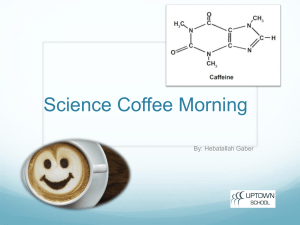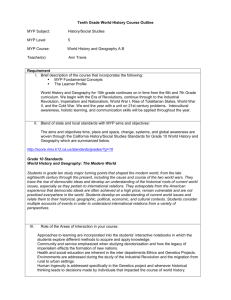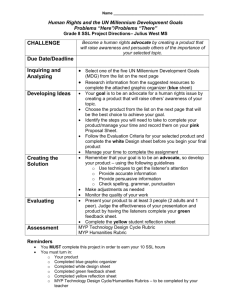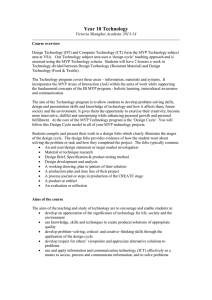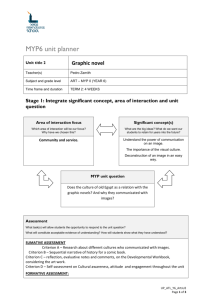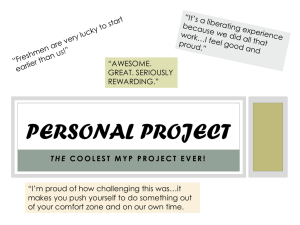IB MYP Biology Syllabus Fall 2014 Yu
advertisement
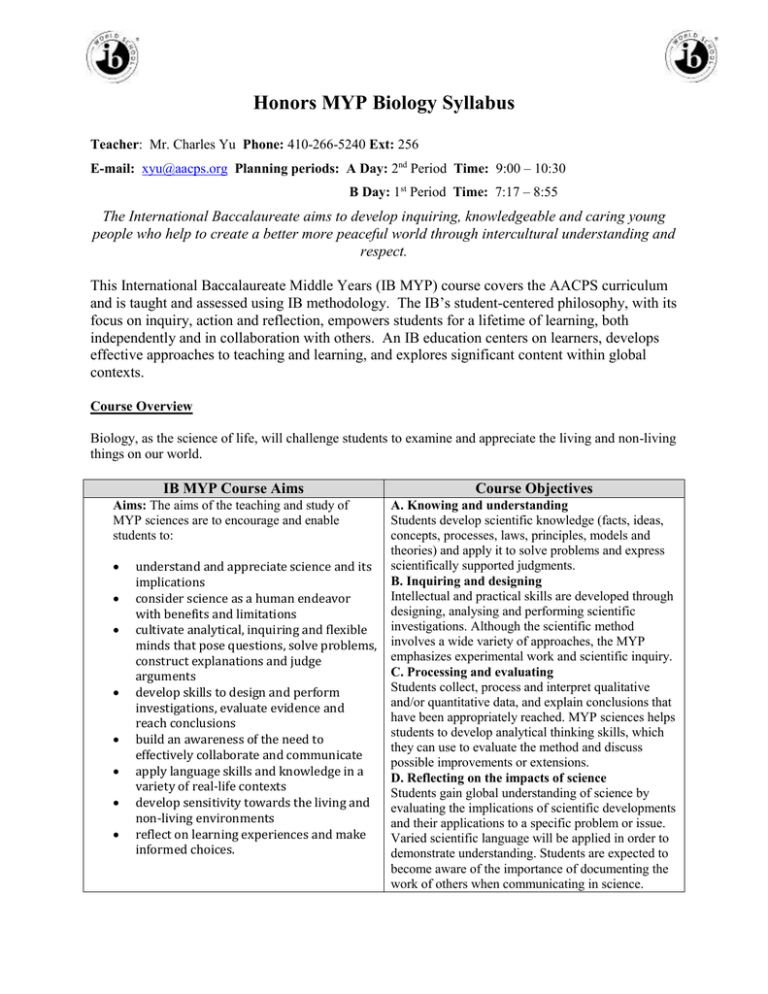
Honors MYP Biology Syllabus Teacher: Mr. Charles Yu Phone: 410-266-5240 Ext: 256 E-mail: xyu@aacps.org Planning periods: A Day: 2nd Period Time: 9:00 – 10:30 B Day: 1st Period Time: 7:17 – 8:55 The International Baccalaureate aims to develop inquiring, knowledgeable and caring young people who help to create a better more peaceful world through intercultural understanding and respect. This International Baccalaureate Middle Years (IB MYP) course covers the AACPS curriculum and is taught and assessed using IB methodology. The IB’s student-centered philosophy, with its focus on inquiry, action and reflection, empowers students for a lifetime of learning, both independently and in collaboration with others. An IB education centers on learners, develops effective approaches to teaching and learning, and explores significant content within global contexts. Course Overview Biology, as the science of life, will challenge students to examine and appreciate the living and non-living things on our world. IB MYP Course Aims Course Objectives Aims: The aims of the teaching and study of MYP sciences are to encourage and enable students to: A. Knowing and understanding Students develop scientific knowledge (facts, ideas, concepts, processes, laws, principles, models and theories) and apply it to solve problems and express scientifically supported judgments. B. Inquiring and designing Intellectual and practical skills are developed through designing, analysing and performing scientific investigations. Although the scientific method involves a wide variety of approaches, the MYP emphasizes experimental work and scientific inquiry. C. Processing and evaluating Students collect, process and interpret qualitative and/or quantitative data, and explain conclusions that have been appropriately reached. MYP sciences helps students to develop analytical thinking skills, which they can use to evaluate the method and discuss possible improvements or extensions. D. Reflecting on the impacts of science Students gain global understanding of science by evaluating the implications of scientific developments and their applications to a specific problem or issue. Varied scientific language will be applied in order to demonstrate understanding. Students are expected to become aware of the importance of documenting the work of others when communicating in science. understand and appreciate science and its implications consider science as a human endeavor with benefits and limitations cultivate analytical, inquiring and flexible minds that pose questions, solve problems, construct explanations and judge arguments develop skills to design and perform investigations, evaluate evidence and reach conclusions build an awareness of the need to effectively collaborate and communicate apply language skills and knowledge in a variety of real-life contexts develop sensitivity towards the living and non-living environments reflect on learning experiences and make informed choices. Assessment Students will be informally assessed throughout each unit, and formally assessed at the end of each unit. Students will be assessed through various assignments, including laboratory reports, projects, science research connections (SRC), quizzes, and tests. These assignments will be graded using the four MYP science criteria. Not every assignment will be assessed using all four criteria. Students will know the specific criteria being assessed prior to beginning an assignment. In MYP Honors Biology, students are assessed using the following criteria: Criterion A: Knowing and understanding i. explain scientific knowledge ii. apply scientific knowledge and understanding to solve problems set in familiar and unfamiliar situations iii. analyse and evaluate information to make scientifically supported judgments. Criterion B: Inquiring and designing i. explain a problem or question to be tested by a scientific investigation ii. formulate a testable hypothesis and explain it using scientific reasoning iii. explain how to manipulate the variables and explain how data will be collected iv. design scientific investigations. Criterion C: Processing and evaluating i. present collected and transformed data ii. interpret data and explain results using scientific reasoning iii. evaluate the validity of a hypothesis based on the outcome of the scientific investigation iv. evaluate the validity of the method v. explain improvements or extensions to the method. Criterion D: Reflecting on the impacts of science i. explain the ways in which science is applied and used to address a specific problem or issue ii. discuss and evaluate the various implications of using science and its application to solve a specific problem or issue iii. apply scientific language effectively iv. document the work of others and sources of information used. Required materials Students are expected to bring the following materials to every class every day. 1. 3” Binder (with dividers) 2. Lined Paper 3. Pencil and/or Pen 4. Agenda (given out on Day 1, kept in binder) 5. Compostion Book Textbooks and Resources Students have the option of taking home a textbook or accessing the textbook online. Miller, Kenneth R., and Joseph S. Levine. Biology. Pearson, 2011. Online textbook: This link can be found here, or on the school webpage under our class page. https://www.pearsonsuccessnet.com/snpapp/login/PsnLandingPage.jsp?showLandingPage=true Username: AHighPanther Password: Annapolis1 Grading/Assessment: A (89.5-100%) - Outstanding level of achievement B (80-89%) - High level of achievement C (70-79%) - Satisfactory level of achievement D (60-69%) - Low level of achievement E (59% -50)- Failure 0 – If student does not attempt the work Grades will be assessed in the following weighted categories: 60%--Tests/Quizzes 25%--Laboratory Reports 15%--Homework (includes SRCs, unit projects, science fair project, and other assigned homework) Minimum: A minimum grade of 50% will be given for all assignments or assessments for which the student made a good faith effort, as determined by the teacher. If a student does no work on an assignment or assessment, the teacher shall assign a grade of zero. Approximate expectations for assignments and assessments: Homework- daily Classwork- every other day Major Projects- once per unit (every two weeks) Major Unit Tests- once per unit (every two-three weeks) Parent Notification: Parents will be notified at least three weeks prior to the end of a marking period if a student is currently earning a failing grade. At any time, parents may check parentconnect.aacps.org to see their student’s grade. Please contact the guidance office if you do not already have a login. Late Work/Redo’s: Please endeavor to turn all work in when due. If you have a reason that the work must be late please meet with me. Redo’s: Students shall have ONE additional chance to improve their score on a major test or assessment (as designated by the teacher). In order for this to happen the student MUST have submitted the original assignment ON TIME and set up a time with the teacher for re-teaching within 5 days of getting the graded assignment back. After the re-teaching, the student will have 10 days to resubmit the assignment. The higher grade will be the grade of record. Work that will be reassessed includes: Unit Tests, Quizzes, Lab Reports Work that will not be reassessed includes: Unit Projects, AACPS Benchmarks, Science Fair Project, SRCs, other Homework All student re-teaching will take place after school on Tuesdays or by appointment. Please try to schedule this meeting in advance so that we both are prepared. Attendance/Tardiness: IF YOU ARE ABSENT, PLEASE CONTACT me at xyu@aacps.org or check the school webpage to receive your make up work. All effort will be made to facilitate students when absent. Please make prior arrangements, if possible, to collect work from the instructor for days that are to be missed. It is the Annapolis High School expectation that all students will be on time. The policies for the tardy table will be followed. Academic Integrity: In order to promote the pursuit of academic excellence and learning, Anne Arundel County Public Schools expects its students to conform to specific standards of academic integrity. Academic integrity is an integral part of promoting self-respect, trust, student achievement, and positive relationships among all stakeholders in our school community. Academic integrity means exhibiting honesty in all academic exercises and assignments. Academic dishonesty refers to any form of misconduct that occurs in relation to all formal academic exercises. Cell Phone Expectations: It is the expectation that cell phones and other electronic devices will not be present in the classroom. Exceptions will be made when the lesson plan dictates that the electronic device will be used for an academic purpose. There will be a red/green sign in the classroom that will let the students know when cell phone / electronic device usage is appropriate. Behavioral Expectations: Annapolis High School students, staff, and visitors will make a pledge and commitment to their school and its mission. In doing so, students show respect for themselves, learning, others, and property. Self Others Be prepared Use appropriate school language Have respect for yourself Try your best! Have a “Can Do” Attitude! Listen when others are talking Participate in class activities Use language appropriate for school Avoid conflict in class Offer and accept constructive criticism Learning Come to class daily and on time Bring all required materials Participate in class Study for tests and quizzes by doing practice problems Ask for help when needed Follow instructions and stay on task Complete all assignments on time Property Keep an organized notebook complete with quality notes Keep your space clean Stay in your seat and keep the desk clean We have read the course syllabus for Honors Biology and understand the expectations and policies. Teacher Signature: ______________________________ Student Name:__________________________________Date:______________ Student Signature:_______________________________ Parent/Guardian Name:___________________________________Date:_____________ Parent/Guardian Signature:________________________________ Phone number: ___________________________ Email: ___________________________________ If applicable, please include a second parent/guardian’s contact information: Name:__________________________________ Phone number: ___________________________ Email: ___________________________________ Is there any particular information that would be helpful for me to know as we begin the year to support your student’s success this semester? Do you have any questions or comments?
